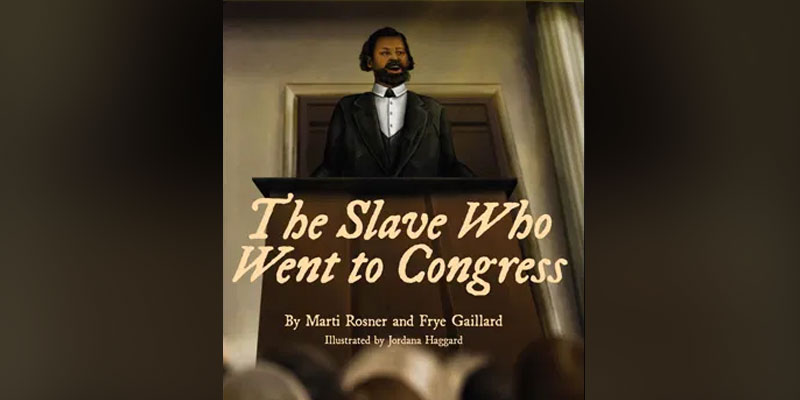This Friday at 6 p.m., join award-winning author Frye Gaillard and education and curriculum specialist Marti Rosner on Facebook Live to learn about their new illustrated book, “The Slave Who Went to Congress,” based on the inspirational true story of Benjamin Turner.
“The story, written for children aged 7-12, shares the struggles and accomplishments of Benjamin Sterling Turner, who lived as a slave for 40 years before being elected as Alabama’s first African American congressman and one of the first in the House of Representatives following Emancipation,” said Lisa Harrison, of NewSouth Books.
Turner, born into slavery in North Carolina in 1825, relocated with his widowed owner, Elizabeth Turner, to Selma when he was 5 years old. It is believed that Turner received some education as a playmate of the family’s white children. Around age 20, Turner was sold to Major W.H. Gee.
According to the U.S. House of Representatives, “Major Gee owned a hotel and a livery stable and permitted Turner to manage the businesses and keep part of the profits.” Following Gee’s death, his brother James inherited Turner, whom he had continue to manage the hotel.
During the Civil War, Union troops destroyed about two-thirds of Selma, including land owned by Turner. Following the war, in an effort to rebuild, Turner established a school for African American children to provide them with the same education and opportunities that he had been afforded.
Within his first five years as a free man, Turner was elected to serve as the Dallas County tax collector and as Selma’s first African American city councilman.
In 1870, Turner was elected into the U.S. House of Representatives. According to the U.S. House of Representatives, Turner spent much of his congressional career seeking financial aid for Alabama, while also supporting universal suffrage and universal amnesty. Regarding amnesty, Turner said, “I have no coals of fiery reproach to heap upon them now. Rather would I extend the olive branch of peace, and say to them, let the past be forgotten.”
Turner lost re-election and returned to his businesses in 1873. The harsh economic swings of the late 1800s caused Turner to die, nearly penniless, on March 21, 1894.
“Through The Slave Who Went to Congress, Gaillard and Rosner bring the lesser known story of the courageous and accomplished Turner to life,” said Harrison.
On the heels of the Alabama’s bicentennial celebration, this book provides an opportunity for reflection and recognition of an important chapter in Alabama history, at a level suitable for younger readers. In addition, NewSouth Books has provided a free lesson plan to help teachers and home-schoolers share this engaging book with their families or students.
Join authors Gaillard and Rosner on Friday, April 17 at 6 p.m. for a Facebook Live conversation about the life of Benjamin Sterling Turner. The authors will discuss the inspiration behind the book, read a selection, and answer questions from the online audience.
(Courtesy of Alabama NewsCenter)













